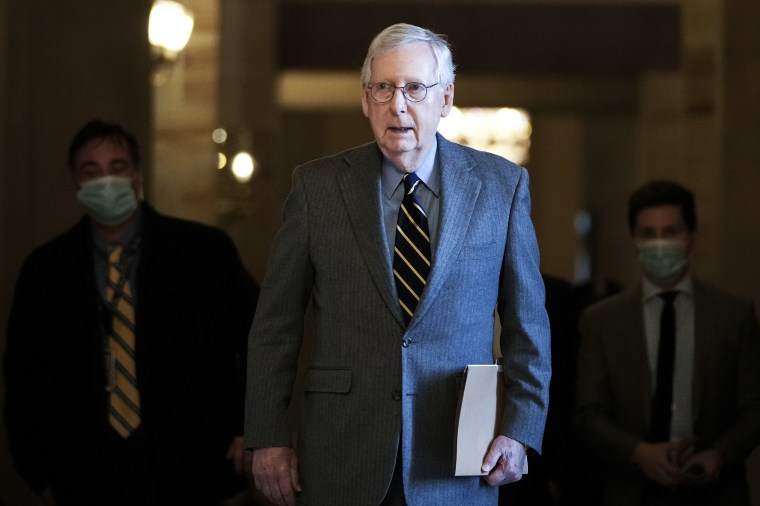WASHINGTON — Senate Minority Leader Mitch McConnell opened the door Wednesday to revising an obscure 1887 election law as Democrats explore ways to protect the will of voters from any future attempts to overturn election results.
"Aside from all the other things they are discussing, this is something that’s worth discussing," McConnell, R-Ky., said one day before the anniversary of the Jan. 6 riot, when supporters of then-President Donald Trump stormed the Capitol in an effort to stop Congress from certifying President Joe Biden's electoral victory.
Capitol Hill is abuzz with new discussions about possible changes to the archaic statute known as the Electoral Count Act that governs the process of counting electoral votes sent by states for presidential contests. Critics, including some members of the Jan. 6 committee in the House, argue the existing law is poorly written and overly ambiguous after Trump's allies sought to exploit gaps to try and reject the outcome of the 2020 election.
Centrist Sen. Susan Collins, R-Maine, said she's "completely" open to revising the 1887 law and is working on proposals to do so.
"For one thing, I think that we need to clarify the role of the vice president and make it clear the vice president cannot overturn the electoral results. If [former] Vice President [Mike] Pence hadn't been so strong last Jan. 6 — or if we had a future vice president who wasn't as strong — we need to make the law clear," Collins told NBC News on Wednesday. "That's one example."
Sen. Pat Toomey, R-Pa., who is retiring from Congress in January 2023 and voted to convict Trump on impeachment charges last year, also expressed interest in some changes to the Electoral Count Act.
"I think you could make a good case that we ought to revisit the statute. I think it's — if I remember correctly — it's very old," he said. "It should be very, very clear that the Congress' role is a ministerial one. That might benefit from an update."
A Senate Republican leadership aide said that "some members within the conference want to have a discussion about the" Electoral Count Act.
Senate Majority Leader Chuck Schumer, D-N.Y., said revising the 1887 law without protecting access to the ballot "makes no sense whatsoever."
"If you're going to rig the game, and then say, 'Oh, we'll count the rigged game accurately.' What good is that?" he said Tuesday.
White House spokesman Andrew Bates said Wednesday that changing the Electoral Count Act is "no substitute" for bolstering voting rights, and called on GOP senators to stop "doing dirty work" on behalf of the "big lie" of a stolen election in 2020.
"The President has been crystal clear that the pending voting rights legislation, the Freedom to Vote Act and the John Lewis Voting Rights Advancement Act, are essential for protecting the constitutional right to vote, the rule of law, and the integrity of our elections against un-American attacks based on the Big Lie," Bates said in an email to NBC News. "There is no substitute. Period."
Republicans strenuously oppose the Freedom to Vote Act, which would establish a series of voting-access guarantees across all states while insulating election officials from undue partisan influence, and the John Lewis Voting Rights Advancement Act, a measure that would raise the bar for states with a history of discrimination to change voting laws. Democrats have made it a priority to pass both pieces of legislation, but they lack the votes to clear a filibuster for either one in the Senate.
Changes to the Electoral Count Act are part of a separate — and new — debate that may have a viable path to 60 votes in the Senate, if the recent Republican openness is any indication.
"Anything that we can do to enhance the process to make it much more secure is something we should be looking at," centrist Sen. Joe Manchin, D-W.Va., said when asked about changes to the 1887 law.
Sen. Mike Rounds, R-S.D., said it's too early to know if the fresh discussions will translate to legislation.
"I had heard earlier that some members were at least going to look at the possibility. But whether or not that actually translates in the legislation is yet to be determined," he said in an interview. "And how long that takes, or where that falls in the political process here at this stage of the game with everything else going on — I'm not sure that we're going to see that coming up in the near future."
"This is one of those items which has time before it comes up," Rounds added.
Sen. Rick Scott, R-Fla., was noncommittal on changing the 1887 statute: "Whatever comes up, I'll go through it."
Trump, however, is one possible political hurdle to passing new legislation aimed at protecting elections. The former president retains intense support within the GOP base, and he has continued to spread conspiracy theories about the 2020 contest, with fabricated claims that Biden's victory was aided by widespread fraud.
Some Republican lawmakers may be wary of crossing him and his most passionate followers.
"There hasn't been enough talk about me to come to a conclusion, whether it would have enough support," Sen. Tommy Tuberville, R-Ala., said. "It could get to first base but we'll see what happens."


